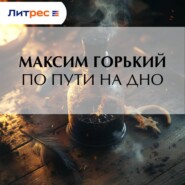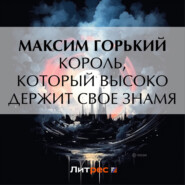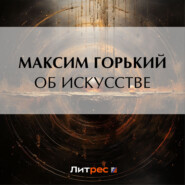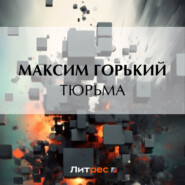По всем вопросам обращайтесь на: info@litportal.ru
(©) 2003-2024.
✖
The Man Who Was Afraid
Настройки чтения
Размер шрифта
Высота строк
Поля
“There you have it!” exclaimed Mayakin, bitterly, pointing at his godson. “You see?”
A dull grumble of protest burst forth.
“Well, it’s all the same!” resumed Foma with a sigh. “It’s all the same! Nothing – no good came out of it anyway.”
And again he bent over the table.
“What did you want?” asked Mayakin, sternly.
“What I wanted?” Foma raised his head, looked at the merchants and smiled. “I wanted – ”
“Drunkard! Nasty scamp!”
“I am not drunk!” retorted Foma, morosely. “I have drank only two glasses. I was perfectly sober.”
“Consequently,” said Bobrov, “you are right, Yakov Tarasovich, he is insane.”
“I?” exclaimed Foma.
But they paid no attention to him. Reznikov, Zubov and Bobrov leaned over to Mayakin and began to talk in low tones.
“Guardianship!” Foma’s ears caught this one word. “I am in my right mind!” he said, leaning back in his chair and staring at the merchants with troubled eyes. “I understand what I wanted. I wanted to speak the truth. I wanted to accuse you.”
He was again seized with emotion, and he suddenly jerked his hands in an effort to free them.
“Eh! Hold on!” exclaimed Bobrov, seizing him by the shoulders. “Hold him.”
“Well, hold me!” said Foma with sadness and bitterness. “Hold me – what do you need me for?”
“Sit still!” cried his godfather, sternly.
Foma became silent. He now understood that what he had done was of no avail, that his words had not staggered the merchants. Here they stood, surrounding him in a dense throng, and he could not see anything for them. They were calm, firm, treating him as a drunkard and a turbulent fellow, and were plotting something against him. He felt himself pitiful, insignificant, crushed by that dark mass of strong-souled, clever and sedate people. It seemed to him that a long time had passed since he had abused them, so long a time that he himself seemed as a stranger, incapable of comprehending what he had done to these people, and why he had done it. He even experienced in himself a certain feeling of offence, which resembled shame at himself in his own eyes. There was a tickling sensation in his throat, and he felt there was something foreign in his breast, as though some dust or ashes were strewn upon his heart, and it throbbed unevenly and with difficulty. Wishing to explain to himself his act, he said slowly and thoughtfully, without looking at anyone:
“I wanted to speak the truth. Is this life?”
“Fool!” said Mayakin, contemptuously. “What truth can you speak? What do you understand?”
“My heart is wounded, that I understand! What justification have you all in the eyes of God? To what purpose do you live? Yes, I feel – I felt the truth!”
“He is repenting!” said Reznikov, with a sarcastic smile.
“Let him!” replied Bobrov, with contempt.
Some one added:
“It is evident, from his words, that he is out of his wits.”
“To speak the truth, that’s not given to everyone!” said Yakov Tarasovich, sternly and instructively, lifting his hand upward. “It is not the heart that grasps truth; it is the mind; do you understand that? And as to your feeling, that’s nonsense! A cow also feels when they twist her tail. But you must understand, understand everything! Understand also your enemy. Guess what he thinks even in his dreams, and then go ahead!”
According to his wont, Mayakin was carried away by the exposition of his practical philosophy, but he realised in time that a conquered man is not to be taught how to fight, and he stopped short. Foma cast at him a dull glance, and shook his head strangely.
“Lamb!” said Mayakin.
“Leave me alone!” entreated Foma, plaintively. “It’s all yours! Well, what else do you want? Well, you crushed me, bruised me, that serves me right! Who am I? O Lord!”
All listened attentively to his words, and in that attention there was something prejudiced, something malicious.
“I have lived,” said Foma in a heavy voice. “I have observed. I have thought; my heart has become wounded with thoughts! And here – the abscess burst. Now I am utterly powerless! As though all my blood had gushed out. I have lived until this day, and still thought that now I will speak the truth. Well, I have spoken it.”
He talked monotonously, colourlessly, and his speech resembled that of one in delirium.
“I have spoken it, and I have only emptied myself, that’s all. Not a trace have my words left behind them. Everything is uninjured. And within me something blazed up; it has burned out, and there’s nothing more there. What have I to hope for now? And everything remains as it was.”
Yakov Tarasovich burst into bitter laughter.
“What then, did you think to lick away a mountain with your tongue? You armed yourself with malice enough to fight a bedbug, and you started out after a bear, is that it? Madman! If your father were to see you now. Eh!”
“And yet,” said Foma, suddenly, loudly, with assurance, and his eyes again flared up, “and yet it is all your fault! You have spoiled life! You have made everything narrow. We are suffocating because of you! And though my truth against you is weak, it is truth, nevertheless! You are godless wretches! May you all be cursed!”
He moved about in his chair, attempting to free his hands, and cried out, flashing his eyes with fury:
“Unbind my hands!”
They came closer to him; the faces of the merchants became more severe, and Reznikov said to him impressively:
“Don’t make a noise, don’t be bothersome! We’ll soon be in town. Don’t disgrace yourself, and don’t disgrace us either. We are not going to take you direct from the wharf to the insane asylum.”
“So!” exclaimed Foma. “So you are going to put me into an insane asylum?”
No one replied. He looked at their faces and hung his head.
“Behave peacefully! We’ll unbind you!” said someone.
“It’s not necessary!” said Foma in a low voice. “It’s all the same. I spit on it! Nothing will happen.”
And his speech again assumed the nature of a delirium.
“I am lost, I know it! Only not because of your power, but rather because of my weakness. Yes! You, too, are only worms in the eyes of God. And, wait! You shall choke. I am lost through blindness. I saw much and I became blind, like an owl. As a boy, I remember, I chased an owl in a ravine; it flew about and struck against something. The sun blinded it. It was all bruised and it disappeared, and my father said to me then: ‘It is the same with man; some man bustles about to and fro, bruises himself, exhausts himself, and then throws himself anywhere, just to rest.’ Hey I unbind my hands.”
His face turned pale, his eyes closed, his shoulders quivered. Tattered and crumpled he rocked about in the chair, striking his chest against the edge of the table, and began to whisper something.
The merchants exchanged significant glances. Some, nudging one another in the sides, shook their heads at Foma in silence. Yakov Mayakin’s face was dark and immobile as though hewn out of stone.
“Shall we perhaps unbind him?” whispered Bobrov.
“When we get a little nearer.”
“No, it’s not necessary,” said Mayakin in an undertone-“We’ll leave him here. Let someone send for a carriage. We’ll take him straight to the asylum.”
A dull grumble of protest burst forth.
“Well, it’s all the same!” resumed Foma with a sigh. “It’s all the same! Nothing – no good came out of it anyway.”
And again he bent over the table.
“What did you want?” asked Mayakin, sternly.
“What I wanted?” Foma raised his head, looked at the merchants and smiled. “I wanted – ”
“Drunkard! Nasty scamp!”
“I am not drunk!” retorted Foma, morosely. “I have drank only two glasses. I was perfectly sober.”
“Consequently,” said Bobrov, “you are right, Yakov Tarasovich, he is insane.”
“I?” exclaimed Foma.
But they paid no attention to him. Reznikov, Zubov and Bobrov leaned over to Mayakin and began to talk in low tones.
“Guardianship!” Foma’s ears caught this one word. “I am in my right mind!” he said, leaning back in his chair and staring at the merchants with troubled eyes. “I understand what I wanted. I wanted to speak the truth. I wanted to accuse you.”
He was again seized with emotion, and he suddenly jerked his hands in an effort to free them.
“Eh! Hold on!” exclaimed Bobrov, seizing him by the shoulders. “Hold him.”
“Well, hold me!” said Foma with sadness and bitterness. “Hold me – what do you need me for?”
“Sit still!” cried his godfather, sternly.
Foma became silent. He now understood that what he had done was of no avail, that his words had not staggered the merchants. Here they stood, surrounding him in a dense throng, and he could not see anything for them. They were calm, firm, treating him as a drunkard and a turbulent fellow, and were plotting something against him. He felt himself pitiful, insignificant, crushed by that dark mass of strong-souled, clever and sedate people. It seemed to him that a long time had passed since he had abused them, so long a time that he himself seemed as a stranger, incapable of comprehending what he had done to these people, and why he had done it. He even experienced in himself a certain feeling of offence, which resembled shame at himself in his own eyes. There was a tickling sensation in his throat, and he felt there was something foreign in his breast, as though some dust or ashes were strewn upon his heart, and it throbbed unevenly and with difficulty. Wishing to explain to himself his act, he said slowly and thoughtfully, without looking at anyone:
“I wanted to speak the truth. Is this life?”
“Fool!” said Mayakin, contemptuously. “What truth can you speak? What do you understand?”
“My heart is wounded, that I understand! What justification have you all in the eyes of God? To what purpose do you live? Yes, I feel – I felt the truth!”
“He is repenting!” said Reznikov, with a sarcastic smile.
“Let him!” replied Bobrov, with contempt.
Some one added:
“It is evident, from his words, that he is out of his wits.”
“To speak the truth, that’s not given to everyone!” said Yakov Tarasovich, sternly and instructively, lifting his hand upward. “It is not the heart that grasps truth; it is the mind; do you understand that? And as to your feeling, that’s nonsense! A cow also feels when they twist her tail. But you must understand, understand everything! Understand also your enemy. Guess what he thinks even in his dreams, and then go ahead!”
According to his wont, Mayakin was carried away by the exposition of his practical philosophy, but he realised in time that a conquered man is not to be taught how to fight, and he stopped short. Foma cast at him a dull glance, and shook his head strangely.
“Lamb!” said Mayakin.
“Leave me alone!” entreated Foma, plaintively. “It’s all yours! Well, what else do you want? Well, you crushed me, bruised me, that serves me right! Who am I? O Lord!”
All listened attentively to his words, and in that attention there was something prejudiced, something malicious.
“I have lived,” said Foma in a heavy voice. “I have observed. I have thought; my heart has become wounded with thoughts! And here – the abscess burst. Now I am utterly powerless! As though all my blood had gushed out. I have lived until this day, and still thought that now I will speak the truth. Well, I have spoken it.”
He talked monotonously, colourlessly, and his speech resembled that of one in delirium.
“I have spoken it, and I have only emptied myself, that’s all. Not a trace have my words left behind them. Everything is uninjured. And within me something blazed up; it has burned out, and there’s nothing more there. What have I to hope for now? And everything remains as it was.”
Yakov Tarasovich burst into bitter laughter.
“What then, did you think to lick away a mountain with your tongue? You armed yourself with malice enough to fight a bedbug, and you started out after a bear, is that it? Madman! If your father were to see you now. Eh!”
“And yet,” said Foma, suddenly, loudly, with assurance, and his eyes again flared up, “and yet it is all your fault! You have spoiled life! You have made everything narrow. We are suffocating because of you! And though my truth against you is weak, it is truth, nevertheless! You are godless wretches! May you all be cursed!”
He moved about in his chair, attempting to free his hands, and cried out, flashing his eyes with fury:
“Unbind my hands!”
They came closer to him; the faces of the merchants became more severe, and Reznikov said to him impressively:
“Don’t make a noise, don’t be bothersome! We’ll soon be in town. Don’t disgrace yourself, and don’t disgrace us either. We are not going to take you direct from the wharf to the insane asylum.”
“So!” exclaimed Foma. “So you are going to put me into an insane asylum?”
No one replied. He looked at their faces and hung his head.
“Behave peacefully! We’ll unbind you!” said someone.
“It’s not necessary!” said Foma in a low voice. “It’s all the same. I spit on it! Nothing will happen.”
And his speech again assumed the nature of a delirium.
“I am lost, I know it! Only not because of your power, but rather because of my weakness. Yes! You, too, are only worms in the eyes of God. And, wait! You shall choke. I am lost through blindness. I saw much and I became blind, like an owl. As a boy, I remember, I chased an owl in a ravine; it flew about and struck against something. The sun blinded it. It was all bruised and it disappeared, and my father said to me then: ‘It is the same with man; some man bustles about to and fro, bruises himself, exhausts himself, and then throws himself anywhere, just to rest.’ Hey I unbind my hands.”
His face turned pale, his eyes closed, his shoulders quivered. Tattered and crumpled he rocked about in the chair, striking his chest against the edge of the table, and began to whisper something.
The merchants exchanged significant glances. Some, nudging one another in the sides, shook their heads at Foma in silence. Yakov Mayakin’s face was dark and immobile as though hewn out of stone.
“Shall we perhaps unbind him?” whispered Bobrov.
“When we get a little nearer.”
“No, it’s not necessary,” said Mayakin in an undertone-“We’ll leave him here. Let someone send for a carriage. We’ll take him straight to the asylum.”

















